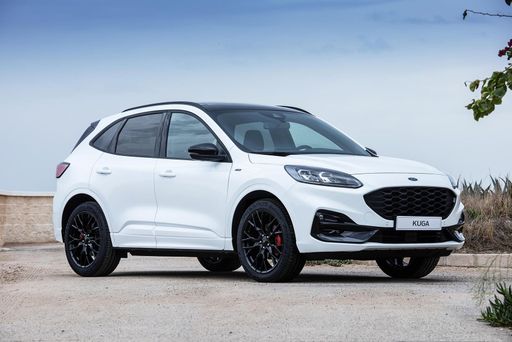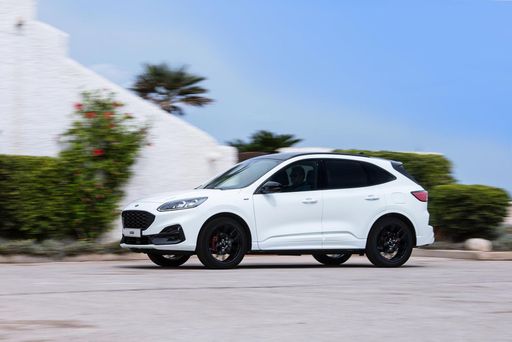Ford Kuga vs Toyota Yaris - Differences and prices compared
Costs and Efficiency:
Looking at overall running costs, both models reveal some interesting differences in everyday economy.
Toyota Yaris has a convincingly advantage in terms of price – it starts at 21900 £, while the Ford Kuga costs 34200 £. That’s a price difference of around 12385 £.
Fuel consumption also shows a difference: Ford Kuga manages with 2.80 L and is therefore evident more efficient than the Toyota Yaris with 3.80 L. The difference is about 1 L per 100 km.
Engine and Performance:
Under the bonnet, it becomes clear which model is tuned for sportiness and which one takes the lead when you hit the accelerator.
When it comes to engine power, the Toyota Yaris has a a bit edge – offering 280 HP compared to 243 HP. That’s roughly 37 HP more horsepower.
In acceleration from 0 to 100 km/h, the Toyota Yaris is evident quicker – completing the sprint in 5.50 s, while the Ford Kuga takes 7.30 s. That’s about 1.80 s faster.
In terms of top speed, the Toyota Yaris performs a bit better – reaching 230 km/h, while the Ford Kuga tops out at 200 km/h. The difference is around 30 km/h.
There’s also a difference in torque: Toyota Yaris pulls clearly perceptible stronger with 390 Nm compared to 240 Nm. That’s about 150 Nm difference.
Space and Everyday Use:
Whether family car or daily driver – which one offers more room, flexibility and comfort?
Seats: offers more seating capacity – vs .
In curb weight, Toyota Yaris is distinct lighter – 1090 kg compared to 1526 kg. The difference is around 436 kg.
In terms of boot space, the Ford Kuga offers distinct more room – 412 L compared to 286 L. That’s a difference of about 126 L.
In maximum load capacity, the Ford Kuga performs evident better – up to 1534 L, which is about 599 L more than the Toyota Yaris.
When it comes to payload, Ford Kuga hardly perceptible takes the win – 550 kg compared to 525 kg. That’s a difference of about 25 kg.
Who comes out on top?
Overall, the Ford Kuga shows itself to be edges ahead and secures the title of DriveDuel Champion.
It convinces with the more balanced overall package and proves to be the more versatile choice for everyday use.
 @ Ford Motor Company / Ford Media Center
@ Ford Motor Company / Ford Media Center
Ford Kuga
Costs and Consumption
View detailed analysis
Engine and Performance
View detailed analysis
Dimensions and Body
View detailed analysis
Ford Kuga
The Kuga is Ford’s adaptable family SUV that blends usable space with a surprisingly lively driving character, making daily commutes and weekend escapes equally enjoyable. With smart interior packaging, an easy-to-use infotainment setup and composed road manners, it’s a sensible choice for buyers who want a bit of fun without the fuss.
details @ Ford Motor Company / Ford Media Center
@ Ford Motor Company / Ford Media Center
 @ Ford Motor Company / Ford Media Center
@ Ford Motor Company / Ford Media Center
 @ Ford Motor Company / Ford Media Center
@ Ford Motor Company / Ford Media Center
Toyota Yaris
The Toyota Yaris is a sprightly city hatch that packs clever packaging, surprising comfort and fuel-sipping manners into a neat, easy-to-park package. It rewards sensible buyers with low running costs, friendly ergonomics and a forgiving drive, delivered with Japanese reliability and just enough personality to make errands feel a little less ordinary.
details @ Toyota Motor Corporation
@ Toyota Motor Corporation
 @ Toyota Motor Corporation
@ Toyota Motor Corporation
 @ Ford Motor Company / Ford Media Center
@ Ford Motor Company / Ford Media Center
|
 @ Toyota Motor Corporation
@ Toyota Motor Corporation
|
|
|
|
Costs and Consumption |
|
|---|---|
|
Price
34200 - 46300 £
|
Price
21900 - 46700 £
|
|
Consumption L/100km
2.8 - 6.8 L
|
Consumption L/100km
3.8 - 9.5 L
|
|
Consumption kWh/100km
-
|
Consumption kWh/100km
-
|
|
Electric Range
68 km
|
Electric Range
-
|
|
Battery Capacity
1.1 - 14.4 kWh
|
Battery Capacity
-
|
|
co2
55 - 154 g/km
|
co2
87 - 215 g/km
|
|
Fuel tank capacity
42 - 54 L
|
Fuel tank capacity
36 - 50 L
|
Dimensions and Body |
|
|---|---|
|
Body Type
SUV
|
Body Type
Hatchback
|
|
Seats
5
|
Seats
4 - 5
|
|
Doors
5
|
Doors
3 - 5
|
|
Curb weight
1526 - 1859 kg
|
Curb weight
1090 - 1356 kg
|
|
Trunk capacity
412 L
|
Trunk capacity
141 - 286 L
|
|
Length
4604 - 4645 mm
|
Length
3940 - 3995 mm
|
|
Width
1882 mm
|
Width
1745 - 1805 mm
|
|
Height
1673 - 1681 mm
|
Height
1455 - 1500 mm
|
|
Max trunk capacity
1534 L
|
Max trunk capacity
935 L
|
|
Payload
541 - 550 kg
|
Payload
289 - 525 kg
|
Engine and Performance |
|
|---|---|
|
Engine Type
Petrol, Full Hybrid, Plugin Hybrid
|
Engine Type
Full Hybrid, Petrol
|
|
Transmission
Manuel, Automatic
|
Transmission
Automatic, Manuel
|
|
Transmission Detail
Manual Gearbox, CVT, Automatic Gearbox
|
Transmission Detail
CVT, Manual Gearbox, Automatic Gearbox
|
|
Drive Type
Front-Wheel Drive, All-Wheel Drive
|
Drive Type
Front-Wheel Drive, All-Wheel Drive
|
|
Power HP
150 - 243 HP
|
Power HP
116 - 280 HP
|
|
Acceleration 0-100km/h
7.3 - 9.9 s
|
Acceleration 0-100km/h
5.5 - 9.7 s
|
|
Max Speed
195 - 200 km/h
|
Max Speed
175 - 230 km/h
|
|
Torque
240 Nm
|
Torque
390 Nm
|
|
Number of Cylinders
3 - 4
|
Number of Cylinders
3
|
|
Power kW
111 - 178 kW
|
Power kW
85 - 206 kW
|
|
Engine capacity
1496 - 2488 cm3
|
Engine capacity
1490 - 1618 cm3
|
General |
|
|---|---|
|
Model Year
2025
|
Model Year
2024 - 2025
|
|
CO2 Efficiency Class
E, D, B
|
CO2 Efficiency Class
B, G
|
|
Brand
Ford
|
Brand
Toyota
|
What drivetrain options does the Ford Kuga have?
The Ford Kuga is available as Front-Wheel Drive or All-Wheel Drive.
The prices and data displayed are estimates based on German list prices and may vary by country. This information is not legally binding.
